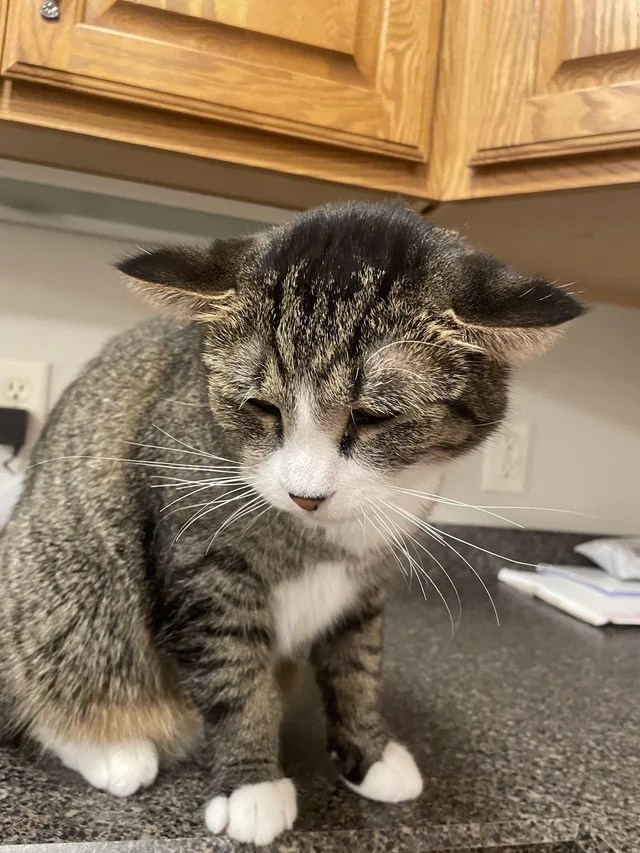I tried to put my shoes in his head
Posted: March 4, 2026 Filed under: Uncategorized | Tags: expressions, George W. Bush, humor, language, malaphors, mixed idioms, words 1 CommentThis odd statement is a congruent conflation of “get in his head” and “walk a mile in his shoes”, both phrases meaning to try to understand the way another person is thinking. This one reminds me of the George W. Bush shoe throwing incident. On December 14, 2008, Iraqi journalist Muntadhar al-Zaidi removed his shoes and threw them at then United States president George W. Bush during a joint press conference with Iraqi prime minister Nouri al-Maliki in Baghdad, Iraq. Bush quickly ducked, avoiding being hit by either shoe. Props to Frozen Cusser for hearing this one and sending it in!

He tore the house upside down
Posted: March 2, 2026 Filed under: Uncategorized | Tags: expressions, humor, language, Lords of Death, malaphors, mixed idioms, words 1 CommentThis subtle malaphor was uttered on the podcast, Lords of Death. It is a mashup of “tear it apart” (violently rip something into pieces) and “turn the house upside down” (searching a place so thoroughly it becomes extremely messy). A big thank you to Anthony Kovacs for hearing this one and sending it in.

Crying fire
Posted: February 27, 2026 Filed under: Uncategorized 1 CommentA coworker said, this one, meaning to say “cry wolf” but evidently misfired. It is a congruent conflation of “crying wolf” and “yelling/shouting fire (in a crowded theater)”, both meaing to raise a false alarm. A shout out to Frozen Cusser for sending this one in!
break the veil
Posted: February 23, 2026 Filed under: Uncategorized 1 CommentThere was a discussion about a soccer player. The speaker said what broke the veil about the player’s reputation was that he couldn’t run very fast. This is a mashup of “lift the veil” (reveal something that was secret or misunderstood) and “break the spell” (to do something that ends a period of enchantment). “Spell” and “veil” seem to go together, conjuring images of genies and magic. “Piercing the corporate veil” might also have been in the speaker’s mind. That is a legal term meaning to find shareholders or directors personally liable for the company’s fraud or abuse. Another shout out to Martin Pietrucha for hearing this one and sending it in!
It fell on flat ears
Posted: February 20, 2026 Filed under: Uncategorized | Tags: expressions, words, malaphors, mixed idioms, language, humor 1 CommentTwo friends were talking about new ideas, and one said he pitched a few to a car company years ago but “everything I said fell on flat ears.” This is a mashup of “fall flat” (fail completely to produce the desired effect) and “fall on deaf ears” (to be ignored). A tip of the hat to frequent malaphor contributor Martin Pietrucha for sharing this one.

I just barely scratched the tip of the iceberg
Posted: February 18, 2026 Filed under: Uncategorized | Tags: Epstein files, expressions, humor, language, malaphors, Maxwell Frost, mixed idioms, MS Now, The Last Word, Trump, words Leave a commentOn the MS NOW show, The Last Word with Lawrence O’Donnell, Congressman Maxwell Frost was talking about going to the Justice Department and conducting a two-hour review of the unredacted Epstein files. Frost then uttered this nice congruent conflation of “barely scratching the surface” and “tip of the iceberg”, both referring to the beginning of a much larger issue or problem. Considering there are 3 million files, I think the Congressman’s description is accurate. A big thank you to Ron MacDonald for hearing this one and sending it in!

The needle that will break the camel’s back
Posted: February 16, 2026 Filed under: Uncategorized | Tags: expressions, words, malaphors, mixed idioms, language, humor, Epstein files, LBC, Nora Lee Notzon 1 CommentNora Lee Notzon, a Republican commentator, was talking on the podcast, Leading Britain’s Conversation (LBC), about the Epstein Files and the impact on Keir Starmer. She said, “I think we saw a failure as a leader and this is probably just a needle that will break the camel’s back.” This is a mashup of “the straw that broke the camel’s back” (the final annoyance in a series of events that makes a situation unbearable) and “a camel through the eye of a needle” (used as part of a comparison to indicate that something is impossible or extremely difficult to accomplish). The latter phrase comes from the passage in the Bible (Luke 18:25), “For it is easier for a camel to go through the eye of a needle than for a rich man to enter into the kingdom of God.”. “Camel” is the shared word here that causes the mental hiccup. You can hear the malaphor at 11:22 in this YouTube clip:
A tip of the toque to Mike Kovacs for hearing this one and sending it in!

It’s like I am pulling hairs to make it happen
Posted: February 14, 2026 Filed under: Uncategorized | Tags: expressions, humor, language, malaphors, mixed idioms, words Leave a commentMy daughter-in-law was trying to organize several things going on at the same time and she uttered this nice congruent conflation of “pulling teeth” and “pulling my hair out”, both meaning an extreme frustration regarding a difficult situation. “Pulling” is the culprit here, appearing in both idioms. “Pulling strings” (using personal connections to achieve a desired result) might also be in the mix. A tip of the hat to Doree Simon Hatfield for sending this one in!

He’s playing with a loaded rake
Posted: February 9, 2026 Filed under: Uncategorized | Tags: Epstein files, expressions, humor, James Comer, language, malaphors, mixed idioms, words Leave a commentThis one was noticed in a Facebook group. A commenter said, “if Republican Chairman of the Oversight Committee James R. Comer thinks hauling Bill and Hillary Clinton in front of cameras is a political win, he’s playing with a loaded rake.” This is a mashup of “playing with a loaded gun” (engaging in extremely reckless behavior) and “stepping on a(n) (upturned) rake” (falling into a forseeable trap). As the contributor notes, “in other words a self-inflicted wound by doing something stupid.” A big shout out to Tom Justice for spotting this one and sending it in!

trinkle
Posted: February 2, 2026 Filed under: Uncategorized | Tags: expressions, humor, language, malaphors, mixed idioms, word blend, words 1 CommentWith the cold weather, it was advisable to leave the faucet open in the kitchen to allow a small flow of water. But the speaker added, “but just a trinkle!” This is a one word blend congruent conflation malaphor of “trickle” and “sprinkle”, both meaning just a little. “Tinkle” might also be in the mix. I will state for the record that “trinkle” is a rare, Scottish word but is archaic and not used. Therefore I have determined this is a bonafide malaphor. A big thank you to Patti Palladino for uttering this beauty and Skip Kennedy for reporting it to Malaphor Central.
Recent Comments